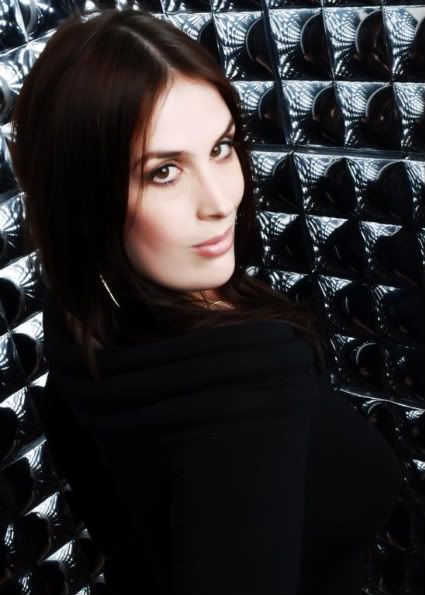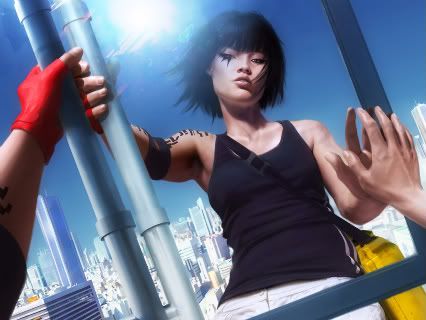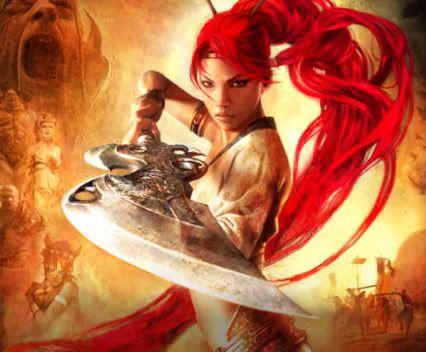
Rhianna Pratchett
Thrilled to finally win an audience with Rhianna Pratchett, we were slightly surprised to find her writing den overrun by small goblin – like creatures. Most of them were scribbling manically on dried kitten skin, while Rhianna cackled with glee from within her oversized helmet.
It seems that the Overlord games are sort of interactive documentaries.
CG: How and why did you come to switch from journalism to writing for games? Is it a decision you’ve ever regretted in any way?
Rhianna: I left my staff job on PC Zone to go freelance back in 2003 and a few weeks later was offered a gig as the story editor on a hardcore RPG. From then on I just mined my industry contacts to get little bits of work here and there. I was lucky that I had eclectic tastes as a reviewer, so I wasn’t trying to approach big-name companies straight off the bat. Although game writing is much harder than most people imagine (including myself, initially) I’ve never regretted the decision.
CG: When you start a project, what’s the typical balance between pitching your own vision and following orders?
Rhianna: There’s neither a typical project nor a typical balance. Vision is also a hard thing to quantify, especially when you’re dealing with something that is a team effort – and narrative can be influenced and shaped by many areas of development.
As far as narrative vision goes, much of it depends on when you’re brought onboard as a writer/narrative designer. If it’s during pre-production (which is rare for writers) you can have more sway in shaping the structure of the story. If you’re taken in during production, especially if all the level design is in place, then it’s more a case of trying to shape a story around what’s already there. And since it can often have been created without narrative in mind, we’re pretty much talking about trying to fit square pegs into round holes.
Considering that writers are narrative specialists (or should be) it is amazing how little they are consulted on the core narrative vision of a project. I’ve been quite lucky with a few of mine, but it’s still largely an uphill struggle.

Incredibly, Faith remains fully clothed for the entirety of her game.
CG: Your female protagonists, particularly Faith from Mirror’s Edge, are a far cry from the female game character archetype. What do you think is the future for female protagonists in games? Do you see your writing influencing the industry at large in any way?
Rhianna: I think that Faith is a rarity because she’s actually dressed suitably for what she does – Although I can’t claim credit for that. It’s not like she’s trying to vanquish hordes of bad guys dressed in something that would fit in a Kinder Surprise egg. For my part, I tried to make sure that she was a well realized character with flaws and screw-ups and some sense of humanity about her. However, a great deal of Faith’s dialogue was actually cut at the 11th hour (it was decided that she wouldn’t speak during levels) so a certain amount of that got lost. Unfortunately, the realities of creating game narrative can be pretty brutal. Nevertheless, characters really are the pillars of a game world, and they need to be given a lot more love across the board – male or female, protagonist, antagonist or NPC.
CG: There was clearly a deep backstory to Mirror’s Edge that was barely touched upon in the final product. Do you feel you’ve said all that you wanted to in the comic miniseries you authored for DC? Do you own enough of the rights to write a novel or another comic?
Rhianna: As I mentioned above, the last minute cuts certainly contributed, as did the fact that when I was brought on board all the game had been designed without much narrative in mind. These are the very real challenges that game writers face on a daily basis. The comic mini-series (which was a prequel to the game’s story) definitely helped me flesh-out a lot of Faith’s background and some of the events in the city that had led to the creation of the Runners.
The series has just been released as collected trade paperback, which was quite exciting, as it’s my first proper spine. However, EA own all the rights, so whatever happens next with Mirror’s Edge is up to them.
CG: Are you working on Mirror’s Edge 2? If so, has joining at the beginning of the project allowed you more freedom and control?
Rhianna: No, I’m not working on the sequel, I’ve moved onto other things. Ultimately, I think everyone learned a lot on Mirror’s Edge. All lessons, even painful ones, can be beneficial. I’m sure Dice will do things differently next time around and involve a writer sooner in the process. I wish them every success in that, I think it’s a wonderful franchise.

"Yes it's my natural hair colour, do you have a problem with that?"
CG: You’ve previously said that you spent a lot of time talking with the actress who played Kai (the heroine of Heavenly Sword) to get the best out of her performance. Do you often get a chance to talk with the actors and actresses? Is it important to you that you do so?
Rhianna: Again, it depends on the project. Although Andy Serkis was the dramatic director and chief actor-wrangler on Heavenly Sword, I did get to chat to some of the main actors and have had contact with a few of them since the project. Race Davies, who played Whiptail, emailed to ask me to keep her in mind for any more monstrous females I might have within. She’s definitely top of the list!
I had a lot to do with the actors on the Overlord franchise, as I cast and directed most of them, particularly for the second game. It was hard work keeping hold of everything, but it’s easier to do when you’re part of a smaller team. I think the writer’s presence in the recording studio is essential, regardless of whether they are directing or not.
CG: Is writing for games any more or less difficult than writing for comics, or writing a short story? With so much experience in game scripts, is it fair to say that’s where you feel most comfortable?
Rhianna: Every writing medium has its own set of trials. What makes game narrative particular hard is that more often than not it isn’t treated as a truly integral part of a game’s development cycle. And by truly integral, I mean given the same time, respect and professionalism as any other part of the development process. There are exceptions, of course, but they are by no means industry-wide. Story often plays second-fiddle, hell, even sixth, seventh and eighth fiddle, to many other facets of game creation. Finding your place within a team and enough space to weave in a compelling story are big challenges. Narrative often lives in the corners of a game world – Down the back of the virtual sofa, or peering out warily from under the fridge. Things are getting better, though. Narrative is slowly starting to emerge as its own discipline, and developers are thinking about addressing the needs of story at a much earlier stage.

If you can identify this piece of equipment, you may be a writer yet.
CG: You could become one of the most famous writers in the world, and yet you would still – to many – be known first and foremost as ‘Terry Pratchett’s daughter’. How do you feel about that?
Rhianna: I love my dad and his work, but I’m my own person, carving out my own (rather unusual) career. I admit that it’s a bit annoying when people insinuate that somehow I have it easier because of him (although, I’ve seen people say the same thing about me being female, too, so I can’t really win.) I don’t know whether they imagine that I spend all day languishing beside the pool at chez-Pratchett, occasionally pausing from some serious daiquiri drinking to wave a hand and magically spill forth a pleasing arrangement of consonants and vowels.
In fact it’s just me, in my writer burrow, knuckling down to do the work as best the circumstances allow, amid a regular dousing of blood, sweat, tears and Earl Grey. I’ve been working in the games industry for 12 years and I’ve been a gamer for a very long time, so it’s obviously something that I take very seriously. There’s a Chinese saying that goes something along the lines of: “The man with the fire at his back jumps the widest river”. I think the woman with the fire at her back should just make sure she carries a bloody big fire extinguisher!
CG: Why do you think the quality of writing in most games is so poor? Which game scripts do you admire, and why?
Rhianna: Poor narrative is only a symptom. The cause is down to bad structuring and management at its root. One of the main problems is that game stories and scripts are not given enough time. They are often the last thing thought of and the first thing pulled apart by the wild horses of game development. Often they have to be turned around very quickly, and space for revisions is usually very minimal. Even the best screenwriters don’t get things right first time. Like game design, narrative should be an iterative process, constantly being honed and tweaked to fit the needs of the design and gameplay.
There are a myriad of other little issues, as well, such as too much interference from multiple sources (because everyone believes they’re writer – seemingly more so if it hasn’t actually been proved either way.) Writers can often be very far down the food chain and have little to no contact with the rest of the team, which is far from ideal. You’d be amazed at the horror stories I hear about the way writers and narrative are treated. There’s a great deal of shanking that goes on.
But luckily good stuff does occasionally emerge and I’m a big fan of the narrative in Psychonauts, Vampire: Bloodlines, Bioshock 1 & Bioshock 2, Uncharted 2, Half-Life 2 (and episodes) and Planescape Torment. I also thought that Telltale Games did a great job with the latest Tales of Monkey Island (particularly Episode 3.)
CG: What advice can you give others hoping to write for videogames (apart from reading your books on the subject of course!)?
Rhianna: I wish they were my books, but I just contributed a chapter to each one. The rest are all from other writers who’ve got great experience and offer amazing information about all aspects of game narrative. I thoroughly recommend them. I think my advice can be summed up in three words – Play, write and network. Play lots of games – This might sound obvious, but I’m always being approached by people that want to get into games writing but have very little experience of games themselves, which seems bonkers, frankly. Write – Hone your skills, learn new techniques, take courses, whatever works for you. Network – Go to events like Develop, Game Horizon, GDC and E3. Get out there and actually press the flesh with developers and publishers. You never know when a contact is going to pay off.
For more information on Rhianna and her work, stick your nose in at http://www.rhiannapratchett.com/
















Great interview! It’s so interesting to read about storytelilng trials in this medium. Many good points, but I especially like the one about story emerging from the nooks and crannies. In more conventional narratives, these nooks and crannies are important too to make the world real.
Yeah she’s awesome, there’s not enough writers obviously trying to improve things in the industry in terms of narrative, and the sooner we get more Pratchett penned games, the better.
load of old rubbish. games are the process of the gamer writing their own story. to cause the ‘writer’ or ahem, ‘auter’ (sniff) to ‘write’ the story is to superimpose the ego of the writer over the imagination and self sustaining imagination of the player. A -game- and a good game is one that is a toy car, or toy train, where the imagination is the players prefered companion.
To praise the writer in a game is ‘auter’ ism and extention of the writers ego over the needs of the client or player. The best game writers are invisible.
Even ‘strong’ narrative games that are of the best of best class let the player work within his story.
Her selection of narrative games is first class. Sadly missing sytem shock 2 the daddy of bioshock, things like sanitarium, final fantasy 3 and 7, grim fandango, star control 2,